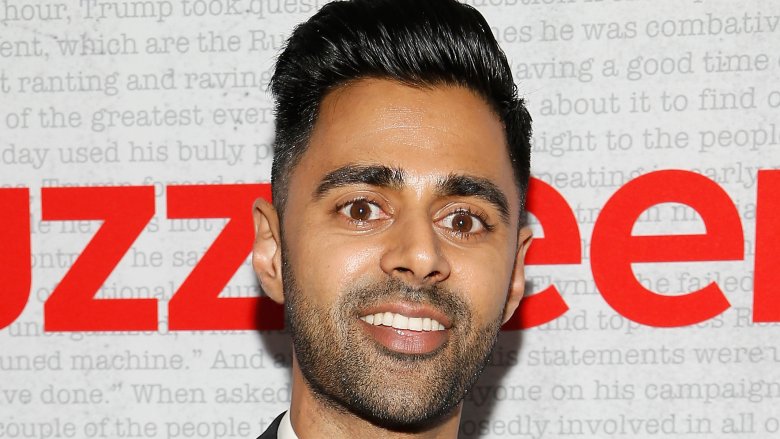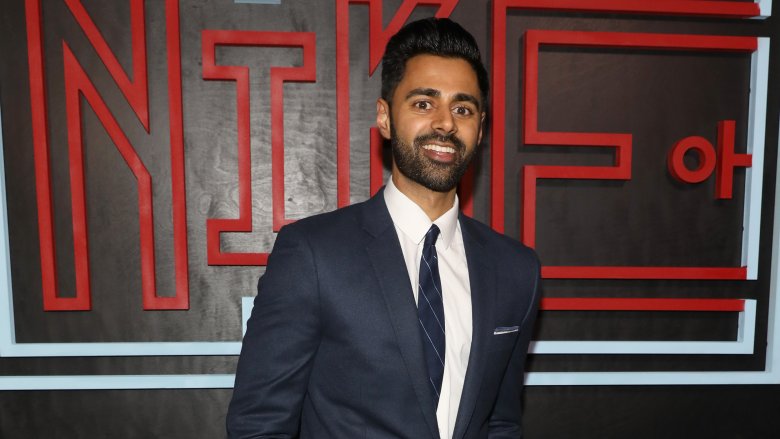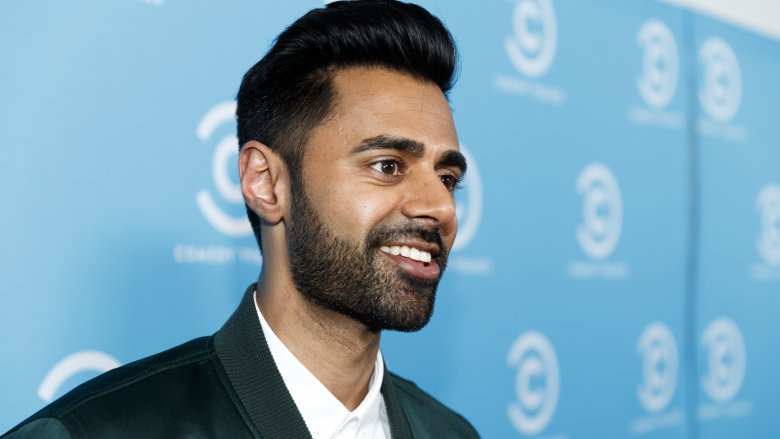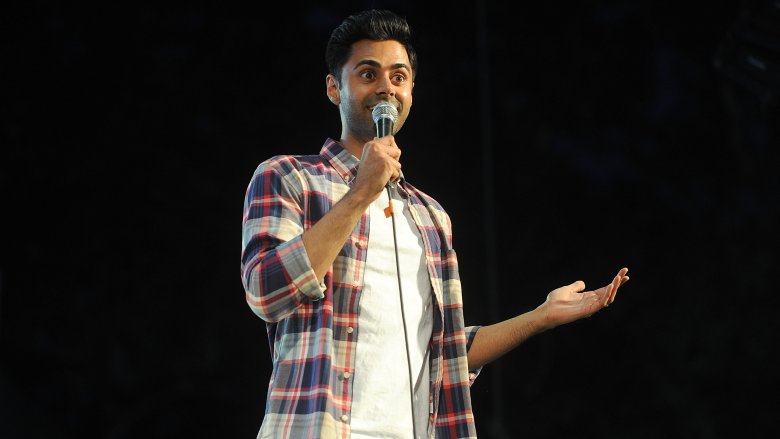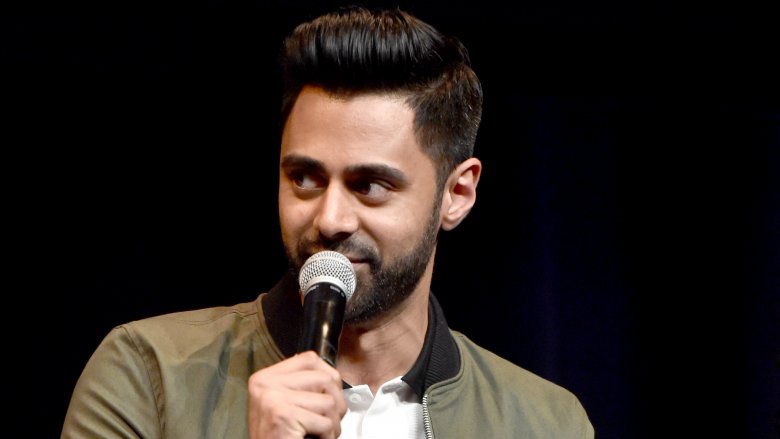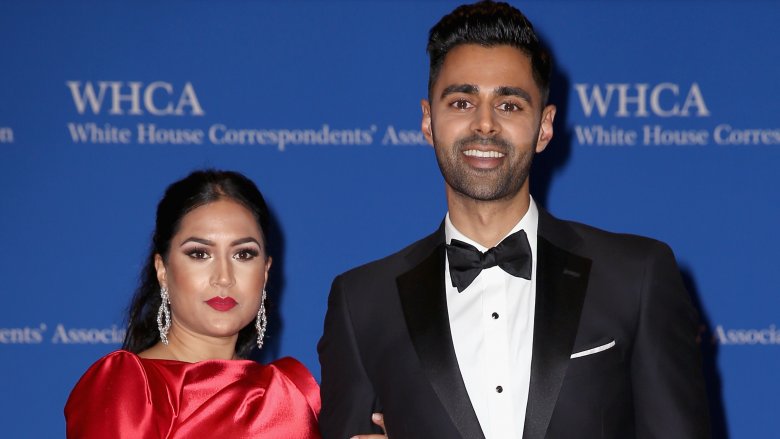Things You Didn't Know About Hasan Minhaj
Hasan Minhaj is best known as a Senior Political Correspondent on The Daily Show with Trevor Noah.
Since joining TDS in 2014 as the last correspondent hired by Jon Stewart, he's produced countless hilarious, yet poignant satirical segments that have gone viral, including "Minhaj's Muslim Makeover" and "Why Wasn't Donald Trump's Bigotry a Deal-Breaker?"
Due to Minhaj's hugely successful stint at the White House Correspondents' Dinner in April and the recent arrival of his popular one-man show Homecoming King on Netflix, 2017 is shaping up to be his biggest year yet.
But how much do you really know about Hasan Minhaj? Let's find out below!
Hasan is a first generation Indian-American Muslim
Minhaj's parents emigrated from India to the United States just before he was born and settled in Davis, California.
As Minhaj revealed to NPR in 2015, his mother returned to India after his birth to complete her medical degree. So, for the first eight years of his life, it was just him and his dad. "We were basically two brown dudes trying to make it in America," the comedian said. "He's trying to navigate being the only brown guy at his work. He's this single guy, but he's married. And he has this kid, this son he's raising. And I'm navigating growing up in this sea of white. I'm this one brown speck in my class photo."
Growing up as a first generation Indian-American Muslim has informed not only much of Minhaj's comedy, but also his identity. As the comedian told NPR in 2017, "I exist in this hyphen. I'm an Indian-American-Muslim kid, but am I more Indian or am I more American? What part of my identity am I?"
As the satirist described it, he often felt like a "third culture kid" — meaning he struggled with not truly fitting in with either the Indian culture of his parents or the predominantly white society of his hometown. This challenge and the racism he often faced as a young person are commonly showcased in his comedy — painful personal anecdotes, in particular, formed the basis of Homecoming King.
He didn't meet his sister until he was eight
Minhaj's younger sister, Ayesha, was initially raised in India by their mother. The two didn't actually meet until he was eight years old and she was five, when she and their mother permanently returned to the States.
As the comedian explained on Stand Up Planet in 2014, "[My parents] come over here and have me, but they can't bring my mom [back] over because of immigration issues. So [my dad] is going back and forth and then he knocks up my mom, and I have a sister, but they don't tell me about her."
"And when they brought my sister over," he continued, "they sat me down in one room and she was in another room. And they brought her in like it was Maury for immigrants. Like, my dad had a card, and he's like, 'Hasan, the results are in: You are the brother!' I'm like, 'Whaaaat?!'"
As Minhaj recently told NPR, he resented his sister at first. "Our narratives are very different. She grew up in India. Like, literally, it took a village. She was around people that loved her and were there for her, and I was this brown kid who was alone in America with his dad. So when she came back, I was just like, 'I hate this person. Who are you? I just wanted a mom, and now I got you.'"
Minhaj is a political science major turned comedian
Minhaj first discovered his love of comedy while studying political science at the University of California, Davis.
As the comedian expressed to Master Chat Magazine in 2016, he initially found his inspiration in Chris Rock's work. "When I grew up, we didn't have cable in the house and so I had never really known what stand-up comedy was," he explained. "I thought it was the stuff at the beginning of Seinfeld where he's standing in front of the brick wall like [doing a Seinfeld impression], 'What's the deal with laundry?' And I thought, 'eh that's not funny. I don't like stand-up.'"
However, that all changed when a college friend introduced him to Chris Rock's Never Scared special during his sophomore year. "I was like, 'Oh my God, I love this!' And that was the end of it. That was the moment when I knew I wanted to do it. I wanted to try stand-up comedy."
After this epiphany, Minhaj began sneaking out of the house to do stand-up at open mics and college campuses around the Bay area.
And in 2008, he got his first big break: He won Comedy Jam's Best Comic Standing competition in San Francisco. This win led to other stand-up opportunities, including opening spots for bigger comic acts, such as Katt Williams, Pablo Francisco, and Gabriel Iglesias.
He hosted his own satirical web series
Before joining TDS, Minhaj hosted his own political satire web series called The Truth with Hasan Minhaj. The show ran from 2012 to 2013 and was produced by the sketch group GoatFace Comedy. And in typical Minhaj style, it specifically tackled relevant sociopolitical issues in a simultaneously informational and humorous manner.
The Truth included a wide range of topics, touching on everything from the first Indian-American Miss America pageant winner to calling out Ashton Kutcher for appearing in brownface in a series of PopChips commercials, as well as addressing the Sikh Temple shooting and Missouri Mosque burning in 2012.
As Minhaj told Master Chat Magazine in 2016, "One of the [motives] behind GoatFace was, 'Hey, we don't see ourselves on screen and why don't we share what we want to see on the screen with the world. Why don't we just make it ourselves?'"
Hasan is an advocate for LGBTQ+ rights
As Minhaj expressed to Bust in 2017, "Fighting for equality is the most American thing you can do." And as an outspoken equal rights activist, he certainly lives up to this ideology. Following the Supreme Court's decision to legalize same-sex marriage nationwide in June 2015, he teamed up with Iranian-American scholar Reza Aslan to pen "An Open Letter to American Muslims on Same-Sex Marriage".
"Hey there. It's two of your brothers. We're writing to you about the Supreme Court's decision," the duo began. "The good news is that a whopping 42% of you support marriage equality ... At the same time, many of you are scandalized by the ruling (we know because you keep tweeting about it)."
"Here's the thing," the authors asserted. "When you are an underrepresented minority — whether Muslim, African American, female, etc. — democracy is an all or nothing business. You fight for everyone's rights (and the operative word here is 'fight'), or you get none for yourself ... Either we are all equal, or the whole thing is just a sham."
And in the letter's impassioned conclusion, Minhaj and Aslan argued, "Bottom line is this: standing up for marginalized communities, even when you disagree with them, is not just the right thing to do, it's the Muslim thing to do. Remember that whole God is merciful and compassionate thing? That extends to all people, not just those who are straight. Celebrate. Don't tolerate. Love really does win."
He hosted the White House Correspondents' Dinner
In April 2017, Minhaj was tapped to host the White House Correspondents' Dinner, and his powerful and blistering speech immediately went viral. "I would say it is an honor to be here, but that would be an alternative fact. No one wanted to do this, so of course it landed in the hands of an immigrant," Minhaj quipped at the top of his set.
After delivering some brutal one-liners at the expense of President Trump and his staff — all of whom famously refused to attend the event — Minhaj poignantly addressed the media.
"You guys are public enemy number one....In the age of Trump, I know that you guys have to be more perfect than ever. You are how the president gets his news. Not from advisors, not from experts, not from intelligence agencies — you guys. So that's why you gotta be on your A game. You gotta be twice as good. You can't make any mistakes. Because when one of you messes up, he blames your entire group. And now you know what it feels like to be a minority." This line was met with a standing ovation.
And the significance of his performance was not lost on the comedian. As he later expressed to People, "I'm the son of immigrants, and I was standing on this stage making fun of the president. It's a really beautiful amazing tradition and it's something worth fighting for, I'll never forget that night."
Minhaj had a little practice beforehand
Before taking on the WHCD gig, Minhaj hosted the Radio and Television Correspondents' Dinner in June 2016. His speech went viral after he blasted Congress for their inaction in passing gun control legislation in the immediate aftermath of the Pulse Orlando shooting.During a four-minute rant, the satirist impassioned, "What we saw in Orlando was one of the ugliest cocktails of the problems that we still see here in America: A cocktail of homophobia, xenophobia, lack of access to mental healthcare, and sheer lack of political will."
"Every day in our workplaces, our homes, and our religious institutions, there is covert or overt discrimination or phobia towards people of different religious, racial, or sexual walks of life. And we just sit there and we let it happen, because it doesn't affect our bottom line," he asserted.
And in a sharp tone, Minhaj powerfully concluded, "When I got into comedy, when you guys got into the media, when you guys got into politics, we wanted to do the best work we could possibly do. And is this what you want your legacy to be? That you were a 'could've done something' Congress, but you didn't because of outside lobbying; that you were complicit in the deaths of thousands of Americans? And look, I know being a member of Congress is hard ... But please, persevere. Because our thoughts and prayers are with you."
He's married
Minhaj married his college sweetheart, Dr. Beena Patel Minhaj, in January 2015. The comedian made the official announcement on Instagram, posting a sweet photo from their big day. Its simple, yet heartfelt caption read: "Finally."
As highlighted in his 2016 New York Times profile, he and Beena, who is a successful management consultant, made the big move to New York City together around that time when Minhaj scored his TDS gig. They now live in a one-bedroom apartment in Hell's Kitchen, facing the Hudson River. "It sounds so clichéd," the correspondent said. "But when we walked in our building it really was, 'this just feels right.'"
"Beena and I didn't move in together until we got married," he added. "We kept it very traditional — Mom, Dad, if you're reading this — so I had to evolve very quickly." The comedian then quipped that he's accepted family photos, throw pillows, and scented candles as a part of married life.
The adorably domestic pair are notoriously private about their relationship, but the few times Hasan has spoken about his wife publicly proves the two are total #RelationshipGoals. As the 31-year-old revealed to Grub Street in 2015, "I've known my wife since college. She's my Mafia wife — she's ride or die."
Homecoming King
Minhaj's deeply personal, insightful, and hilarious one-man show Homecoming King originated on Off-Broadway in 2015, and is now out on Netflix. In this acclaimed stand-up special, Minhaj has married comedy with his personal experiences as an Indian-American Muslim — particularly painful ones — to tackle racism, immigration, and "prom night horrors." In a profound statement of his identity, there are entire bits done in Hindi, forcing members of the audience who don't understand the language to simply catch up to it.
As Minhaj told Exclaim in 2016, Jon Stewart once told him to "'move toward your discomfort and talk about things that people aren't willing to talk about and do the show you feel needs to be done.'" Which is exactly what the comedian has done with this special.
"In the show," he told the publication, "I talk about my journey through all of that but from a place of empathy. I'm acknowledging systemic problems within our country but at the same time I believe there's a tremendous amount of potential within all human beings for empathy, forgiveness, and love. I think there are people from every side who are allies for justice and good."
As Minhaj expressed to Vulture in 2017, "The goal of the special was, this will be my first platform to say, 'This is what it means to be a brown American. Hopefully you can pronounce it, but if you can't, this is what I am, regardless. I am who I am.'"

